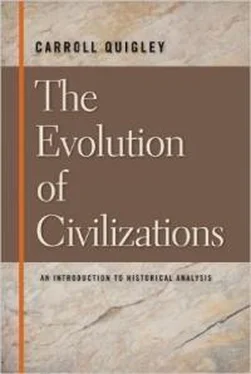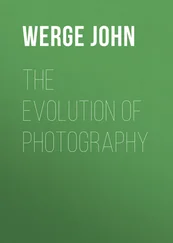In 1938-41, Quigley served a stint at Harvard, tutoring graduate students in ancient and medieval history. It offered little opportunity for the development of cosmic views and he was less than completely content there. It was, however, a happy experience for me. I had entered Harvard Law School. We began the practice of having breakfast together at Carroll and Lillian's apartment.
In 1941 Quigley accepted a teaching appointment at Georgetown's School of Foreign Service. It was to engage his primary energies throughout the rest of his busy life. There he became an almost legendary teacher. He chose to teach a course, "The Development of Civilization," required of the incoming class, and that course ultimately provided the structure and substance for The Evolution of Civilizations. As a course in his hands, it was a vital intellectual experience for young students, a mind-opening adventure. Foreign Service School graduates, meeting years later in careers around the world, would establish rapport with each other by describing their experience in his class. It was an intellectual initiation with remembered impact that could be shared by people who had graduated years apart.
The fortunes of life brought us together again. During World War II I served as a very junior officer on Admiral King's staff in Washington. Carroll and I saw each other frequently. Twenty years later, after practicing law in Oregon, I came into the government with President Kennedy. Our eldest daughter became a student under Carroll at Georgetown University. We bought a house close by Carroll and Lillian. I had Sunday breakfast with them for years and renewed our discussions of the affairs of a disintegrating world.
Superb teacher Quigley was, and could justify a lifetime of prodigious work on that success alone. But ultimately he was more. To me he was a figure—he would scoff at this— like Augustine, Abelard, and Aquinas, searching for the truth through examination of ultimate reality as it was revealed in history. Long ago, he left the church in the formal sense. Spiritually and intellectually he never left it. He never swerved from his search for the meaning of life. He never placed any goal in higher priority. If the God of the Western civilization that Quigley spent so many years studying does exist in the terms that he saw ascribed to him by our civilization, that God will now have welcomed Quigley as one who has pleased him.
In an age characterized by violence, extraordinary personal alienation, and the disintegration of family, church, and community, Quigley chose a life dedicated to rationality. He addressed the problem of explaining change in the world around us, first examined by Heraclitus in ancient Greece. Beneath that constant change, so apparent and itself so real, what is permanent and unchanging?
Quigley wanted an explanation that in its very categorization would give meaning to a history which was a record of constant change. Therefore, the analysis had to include but not be limited to categories of subject areas of human activity—military, political, economic, social, religious, intellectual. It had to describe change in categories expressed sequentially in time—mixture, gestation, expansion, conflict, universal empire, decay, invasion. It was a most ambitious effort to make history rationally understandable. F. E. Manuel, in his review of this book for the American Historical Review, following its first publication in 1961, described it as on "sounder ground" than the work of Toynbee.
Quigley found the explanation of disintegration in the gradual transformation of social "instruments" into "institutions," that is, the transformation of social arrangements functioning to meet real social needs into social institutions serving their own purposes regardless of real social needs. In an ideologically Platonistic society, social arrangements are molded to express a rigidly idealized version of reality. Such institutionalization would not have the flexibility to accommodate to the pressures of changing reality for which the ideology has no categories of thought that will allow perception, analysis, and handling. But the extraordinary distinction of Western civilization is that its ontology allows an open-ended epistemology. It is engaged in a constant effort to understand reality which is perceived as in constant change. Therefore, our categories of knowledge are themselves always subject to change. As a consequence, reform is always possible.
The question today is whether we have lost that Western view of reality which has given our 2,000 years of history its unique vitality, constantly pregnant with new versions of social structure. In Evolution, Quigley describes the basic ideology of Western civilization as expressed in the statement, "The truth unfolds in time through a communal process." Therefore, Quigley saw the triumph in the thirteenth century of the moderate realism of Aquinas over dualistic exaggerated realism derived from Platonism as the major epistemologic triumph that opened up Western civilization. People must constantly search for the "truth" by building upon what others have learned. But no knowledge can be assumed to be complete and final. It could be contradicted by new information received tomorrow. In epistemology, Quigley always retained his belief in the scientific method. Therefore, he saw Hegel and Marx as presumptuous, in error, and outside the Western tradition in their analysis of history as an ideologic dialectic culminating in the present or immediate future in a homeostatic condition. Quigley comments upon the constant repetition of conflict and expansion stages in Western history. That reform process owes its possibility to the uniquely Western belief that truth is continually unfolding. Therefore, Western civilization is capable of reexamining its direction and its institutions, and changing both as appears necessary. So in Western history, there was a succession of technological breakthroughs in agricultural practice and in commerce.
Outmoded institutions like feudalism and—in the commercial area—municipal mercantilism in the period 12701440, and state mercantilism in the period 1690-1810 were discarded. Similarly, we may also survive the economic crisis described by Quigley as monopoly capitalism in the present post-1900 period.
Yet Quigley perceives—correctly in my view—the possible termination of open-ended Western civilization. With access to an explosive technology that can tear the planet apart, coupled with the failure of Western civilization to establish any viable system of world government, local political authority will tend to become violent and absolutist. As we move into irrational activism, states will seize upon ideologies that justify absolutism. The 2,000-year separation in Western history of state and society would then end. Western people would rejoin those of the rest of the world in merging the two into a single entity, authoritarian and static. The age that we are about to enter would be an ideologic one consistent with the views of Hegel and Marx—a homeostatic condition. That triumph would end the Western experiment and return us to the experience of the rest of the world—namely, that history is a sequence of stages in the rise and fall of absolutist ideologies.
America is now in a crisis-disintegrating stage. In such a condition, absent a philosophy, people turn readily to charismatic personalities. So at the beginning of our time of troubles, in the depression of the 1930s, we turned to Franklin D. Roosevelt. He took us through the depression and World War II. We were buoyed by his optimism and reassured by the strength and confidence of his personality. Within the Western tradition he provided us with no solutions; he simply preserved options. When he died, all America was in shock. We had lost our shield. Carroll came over to my place that night. We talked in the subdued fashion of a generation that had lost its guardian and would now have to face a hostile world on its own.
Читать дальше










